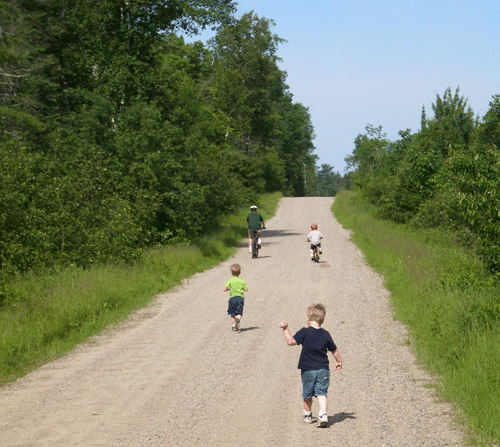The following post is from Christina of Northern Cheapskate: The Financial Implications of Rural Living
Eight years ago, my husband and I made the decision to build a house in the woods on a lake. We had a deal on some family lake property that we couldn’t refuse, and we loved the idea of living in a rural setting.
We both grew up in the country but had spent the previous years living in major cities and a few small towns. We figured we had a pretty good idea of what to expect.
For the most part, our expectations were correct. But we didn’t count on how much having children would change our perspective.
Table of Contents
The financial Downside to Rural Living
The cost of Transportation
We live between two small towns. One is 26 miles to the east and is where we go to the doctor (and have for decades!). It’s also where my husband works. The other town is 28 miles west, where the kids go to school. We volunteer at a few places in this town (and at the school). We have friends in both communities. Taking public transit or riding a bike is not an option. While we try to carpool and combine trips when possible, there isn’t very much wiggle room when it comes to the gas budget.
Our vehicles need more maintenance more often since we travel so many miles on rough roads.
There is also a cost in terms of time. It takes 35 minutes to get to town in good weather and as much as an hour in bad weather. We have to consider whether an activity is worth the time spent to get there. And we have to think about whether we’ll be in town during mealtime (and plan accordingly). Because of the time and the financial costs, we have to carefully consider what activities our kids participate in.
Increased Cost of Phone, Television, and Internet
We’re in a bit of a dead zone when it comes to cellular coverage. Sometimes, we can make cell phone calls, but it’s hit and miss. We need a landline to ensure that we can always make phone calls.
Because much of what my husband and I do for a living is online, we need a fast internet connection. Our only option is satellite internet, which starts at $50 a month and has strict bandwidth restrictions. Skype doesn’t work well. We can’t stream movies through Netflix. We pay close to $90 a month for a bare-bones internet package that doesn’t work when it’s raining.
Digital television isn’t an option for us because we live too far away from the broadcast towers. If we want to watch any television, satellite television is a must.
Increased Household Operating Costs
Homeowners insurance costs more in rural areas because it takes longer for emergency services to reach you. Need a new appliance delivered? It costs more to get it here. Plumbers, electricians, and other contractors also charge more for services to rural customers.
Higher Taxes
More acreage means you’ll pay more in property taxes. You’ll also pay more for the lake shore. And the value of your tax dollars goes down since you don’t get as many of the amenities as city dwellers do (such as quick emergency response or easy access to a public library).
Difficult to earn extra money.
It’s pretty impossible to hold a garage sale where I live. Babysitting jobs require someone to give your teenager a ride. If you’re thinking about picking up a part-time job, you have to figure out the cost of gas to get there, or you could end up working at a job that pays the equivalent of $2 an hour.
The financial Positives of Rural Living
Of course, there are always two sides to every story, and living in the country has plenty of perks, too.
A Healthier Environment
The air is clean, and the water is clear. There are plenty of safe places for the children to explore. It’s very quiet and dark at night, so we get good sleep. We don’t take as many vacations as our city-dwelling friends do because we live in a beautiful, relaxing locale.
Grow a Garden
Gardening is a great way to stretch your grocery budget. The food you grow tastes better and is healthier than anything you can buy in a grocery store, and the entire process is good exercise.
Line Dry Clothes
We save money by using a clothesline to dry our clothes in the summer. If you live in a city, you may not have space to do this, or in some communities, you may not be allowed to. I like knowing I’m helping the environment and saving money.
Know Your Neighbors
Rural living brings people together when there’s a snowstorm, a power outage, or just the need for a tool you don’t have. It’s helpful to have neighbors who watch out for you and are there if you need them. It seemed harder to create those personal bonds when we lived in town.
Easily Unplug
Sure, it’s easier to unplug when you have limited access to technology. It’s also easier to unplug when you’re surrounded by fresh, clean air and beautiful scenery. When we lived in town, we found that we never really felt “at home.” We often felt like work or obligations were pulling us here and there. When we’re at our home in the country, we are truly home and able to fully embrace our family life.
Less Temptation to Spend Money
It’s a lot harder to blow money in a rural area simply because there aren’t as many places to spend your money! We don’t have much for retail shopping. We have no major sporting venues, and a limited amount of cultural events cost money. If you stay off the internet, it’s pretty easy to avoid spending money for long periods of time.
You’re also much more likely to make do or go without when you live in a rural area. When a trip to town and back costs $12 in gas and takes up an hour of time, you don’t rush out to the store to pick up one little thing. Rural living encourages you to be more self-reliant. You’re much more likely to fix something yourself than try to get someone to come out and do it for you. You’re more likely to figure out how to create what you need with what you have instead of buying it in a store.
Final Thoughts on Rural Living
Living in a rural area can be expensive, but there are plenty of benefits, too. We know that even with all of the rural living challenges, we’re still glad we left the city. We love where we live, even if we have to make sacrifices sometimes.
Whether you live in the woods or live in a big city, the important thing is that you embrace where you are and find happiness from within.
As Marcel Proust once said, “The real voyage consists not in seeking new landscapes but in having new eyes.”
Do you live in a rural area or in a city? Which do you prefer?
 |
Christina Brown is the creator of Northern Cheapskate, a blog dedicated to frugal living through coupons, freebies, and money-saving ideas. She lives in the rural north woods of Minnesota, where she clips coupons, pinches pennies, and chases her three boys (a 7-year-old and twin 5-year-olds) as a stay-at-home mom. |




